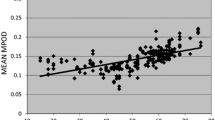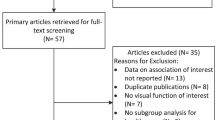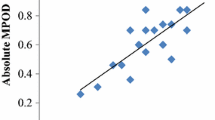Abstract
Background
Macular pigment (MP) might provide some protection against age-related eye disease, and it is now being measured in ophthalmic practice. The purpose of the survey described here was to determine the distribution of MP in a random population of patients in a typical UK ophthalmic practice.
Methods
Macular pigment optical density (MPOD) was measured in 56 patients aged 11 to 87 years, mean 52 ± 19, over a 3-month period. Typically, the test requires setting flicker thresholds for a centrally and peripherally viewed blue/green alternating target. Here we describe the results when an age-based estimate of the peripheral value is used, thus avoiding the peripheral setting. In 32 observers, a comparison was made between this and values obtained with the centre and periphery method. Information on smoking habits, iris colour, diabetic status, and ethnicity were recorded.
Results
The overall average MPOD for the population obtained with the centre-only approach for 56 individuals was 0.400 ± 0.165. The centre-only technique was an accurate predictor of values based on centre and peripheral measures, with 95 % limits of agreement of 0.137 OD units. Pearson’s correlation coefficient showed a high correlation between right and left eyes (r = 0.7 (p < 0.001)). There was a small difference between males and females that did not reach statistical significance (r = −0.22). There was a non-statistically significant age-related decline in MPOD in this particular population (r = −0.17). Dark irides were significantly associated with high MPOD (r = 0.28, p < 0.05). MPOD in Type II diabetic patients was 27 % lower than that in non-diabetics (r = 0.29, p < 0.05).
Conclusion
The technique provides similar values of MP optical density to previous reports. As with other HFP-based methods, in a small percentage of older patients, more than one measurement is required before satisfactory results are obtained.




Similar content being viewed by others
References
de Jong PT (2006) Age-related macular degeneration. N Engl J Med 355:1474–1485
Snodderly DM, Brown PK, Delori FC, Auran JD (1984) The macular pigment. I. Absorbance spectra, localization, and discrimination from other yellow pigments in primate retinas. Invest Ophthalmol Vis Sci 25:660–673
Leung IY (2008) Macular pigment: new clinical methods of detection and the role of carotenoids in age-related macular degeneration. Optometry 79:266–272
Hammond BRJ, Wooten BR, Snodderly DM (1997) Individual variations in the spatial profile of human macular pigment. J Opt Soc Am A Opt Image Sci Vis 14:1187–1196
van der Veen RL, Berendschot TT, Makridaki M, Hendrikse F, Carden D, Murray IJ (2009) Correspondence between retinal reflectometry and a flicker-based technique in the measurement of macular pigment spatial profiles. J Biomed Opt 14:064046
Khachik F, Bernstein PS, Garland DL (1997) Identification of lutein and zeaxanthin oxidation products in human and monkey retinas. Invest Ophthalmol Vis Sci 38:1802–1811
Landrum JT, Bone RA, Kilburn MD (1997) The macular pigment: a possible role in protection from age-related macular degeneration. Adv Pharmacol 38:537–556
Beatty S, Murray IJ, Henson DB, Carden D, Koh H, Boulton ME (2001) Macular pigment and risk for age-related macular degeneration in subjects from a Northern European population. Invest Ophthalmol Vis Sci 42:439–446
Ambati J, Ambati BK, Yoo SH, Ianchulev S, Adamis AP (2003) Age-related macular degeneration: etiology, pathogenesis, and therapeutic strategies. Surv Ophthalmol 48:257–293
Beatty S, Boulton M, Henson D, Koh HH, Murray IJ (1999) Macular pigment and age related macular degeneration. Br J Ophthalmol 83:867–877
Beatty S, Koh H, Phil M, Henson D, Boulton M (2000) The role of oxidative stress in the pathogenesis of age-related macular degeneration. Surv Ophthalmol 45:115–134
Bone RA, Landrum JT, Mayne ST, Gomez CM, Tibor SE, Twaroska EE (2001) Macular pigment in donor eyes with and without AMD: a case–control study. Invest Ophthalmol Vis Sci 42:235–240
Chong EW, Wong TY, Kreis AJ, Simpson JA, Guymer RH (2007) Dietary antioxidants and primary prevention of age related macular degeneration: systematic review and meta-analysis. BMJ 335:755
Bone RA, Landrum JT, Guerra LH, Ruiz CA (2003) Lutein and zeaxanthin dietary supplements raise macular pigment density and serum concentrations of these carotenoids in humans. J Nutr 133:992–998
Richer S, Stiles W, Statkute L, Pulido J, Frankowski J, Rudy D, Pei K, Tsipursky M, Nyland J (2004) Double-masked, placebo-controlled, randomized trial of lutein and antioxidant supplementation in the intervention of atrophic age-related macular degeneration: the Veterans LAST study (Lutein Antioxidant Supplementation Trial). Optometry 75:216–230
Koh HH, Murray IJ, Nolan D, Carden D, Feather J, Beatty S (2004) Plasma and macular responses to lutein supplement in subjects with and without age-related maculopathy: a pilot study. Exp Eye Res 79:21–27
Richer SP, Stiles W, Graham-Hoffman K, Levin M, Ruskin D, Wrobel J, Park DW, Thomas C (2011) Randomized, double-blind, placebo-controlled study of zeaxanthin and visual function in patients with atrophic age-related macular degeneration: the Zeaxanthin and Visual Function Study (ZVF) FDA IND #78, 973. Optometry 82:667 e6–680 e6
Weigert G, Kaya S, Pemp B, Sacu S, Lasta M, Werkmeister RM, Dragostinoff N, Simader C, Garhofer G, Schmidt-Erfurth U, Schmetterer L (2011) Effects of lutein supplementation on macular pigment optical density and visual acuity in patients with age-related macular degeneration. Invest Ophthalmol Vis Sci 52:8174–8178
Berendschot TTJM, Makridaki M, van der Veen RL, Rob LP, Parry NRA, Carden D, Murray IJ (2011) The clear (combination (of) lutein effects (on) aging retina) study; lutein supplementation improves visual acuity and night vision in early Amd; a two-centre, placebo-controlled study. Invest Ophthalmol Vis Sci 52:E-Abstract 3631
Murray IJ, Makridaki M, van der Veen RL, Carden D, Parry NR, Berendschot TT (2013) Lutein supplementation over a 1 year period in early AMD might have a mild beneficial effect on visual acuity; the CLEAR study. Invest Ophthalmol Vis Sci 54(3):1781–1788. doi:10.1167/iovs.12-10715
Khan JC, Thurlby DA, Shahid H, Clayton DG, Yates JR, Bradley M, Moore AT, Bird AC (2006) Smoking and age related macular degeneration: the number of pack years of cigarette smoking is a major determinant of risk for both geographic atrophy and choroidal neovascularisation. Br J Ophthalmol 90:75–80
Seddon JM, Reynolds R, Yu Y, Daly MJ, Rosner B (2011) Risk models for progression to advanced age-related macular degeneration using demographic, environmental, genetic, and ocular factors. Ophthalmology 118:2203–2211
Nolan JM, Feeney J, Kenny RA, Cronin H, O'Regan C, Savva GM, Loughman J, Finucane C, Connolly E, Meagher K, Beatty S (2012) Education is positively associated with macular pigment: the Irish Longitudinal Study on Ageing (TILDA). Invest Ophthalmol Vis Sci 53:7855–7861
Werner JS, Donnelly SK, Kliegl R (1987) Aging and human macular pigment density. Appended with translations from the work of Max Schultze and Ewald Hering. Vis Res 27:257–268
Makridaki M, Carden D, Murray IJ (2009) Macular pigment measurement in clinics: controlling the effect of the ageing media. Ophthalmic Physiol Opt 29:338–344
van der Veen RL, Berendschot TT, Hendrikse F, Carden D, Makridaki M, Murray IJ (2009) A new desktop instrument for measuring macular pigment optical density based on a novel technique for setting flicker thresholds. Ophthalmic Physiol Opt 29:127–137
Snodderly DM, Mares JA, Wooten BR, Oxton L, Gruber M, Ficek T (2004) Macular pigment measurement by heterochromatic flicker photometry in older subjects: the carotenoids and age-related eye disease study. Invest Ophthalmol Vis Sci 45:531–538
Xu J, Pokorny J, Smith VC (1997) Optical density of the human lens. J Opt Soc Am A Opt Image Sci Vis 14:953–960
Nolan JM, Stack J, O' Donovan O, Loane E, Beatty S (2007) Risk factors for age-related maculopathy are associated with a relative lack of macular pigment. Exp Eye Res 84:61–74
Hammond BR Jr, Wooten BR, Snodderly DM (1996) Cigarette smoking and retinal carotenoids: implications for age-related macular degeneration. Vis Res 36:3003–3009
Howells O, Eperjesi F, Bartlett H (2011) Measuring macular pigment optical density in vivo: a review of techniques. Graefes Arch Clin Exp Ophthalmol 249:315–347
Hammond BR Jr, Fuld K, Snodderly DM (1996) Iris color and macular pigment optical density. Exp Eye Res 62:293–297
Wolf-Schnurrbusch UE, Roosli N, Weyermann E, Heldner MR, Hohne K, Wolf S (2007) Ethnic differences in macular pigment density and distribution. Invest Ophthalmol Vis Sci 48:3783–3787
Mellerio J, Ahmadi-Lari S, van Kuijk F, Pauleikhoff D, Bird A, Marshall J (2002) A portable instrument for measuring macular pigment with central fixation. Curr Eye Res 25:37–47
Klein R, Klein BE, Linton KL, DeMets DL (1993) The Beaver Dam eye study: the relation of age-related maculopathy to smoking. Am J Epidemiol 137:190–200
Lima VC, Rosen RB, Maia M, Prata TS, Dorairaj S, Farah ME, Sallum J (2010) Macular pigment optical density measured by dual-wavelength autofluorescence imaging in diabetic and nondiabetic patients: a comparative study. Invest Ophthalmol Vis Sci 51:5840–5845
Acknowledgment
We thank Teresa Tee for helping in the preparation of this paper
Author information
Authors and Affiliations
Corresponding author
Rights and permissions
About this article
Cite this article
Murray, I.J., Hassanali, B. & Carden, D. Macular pigment in ophthalmic practice; a survey. Graefes Arch Clin Exp Ophthalmol 251, 2355–2362 (2013). https://doi.org/10.1007/s00417-013-2430-4
Received:
Revised:
Accepted:
Published:
Issue Date:
DOI: https://doi.org/10.1007/s00417-013-2430-4





